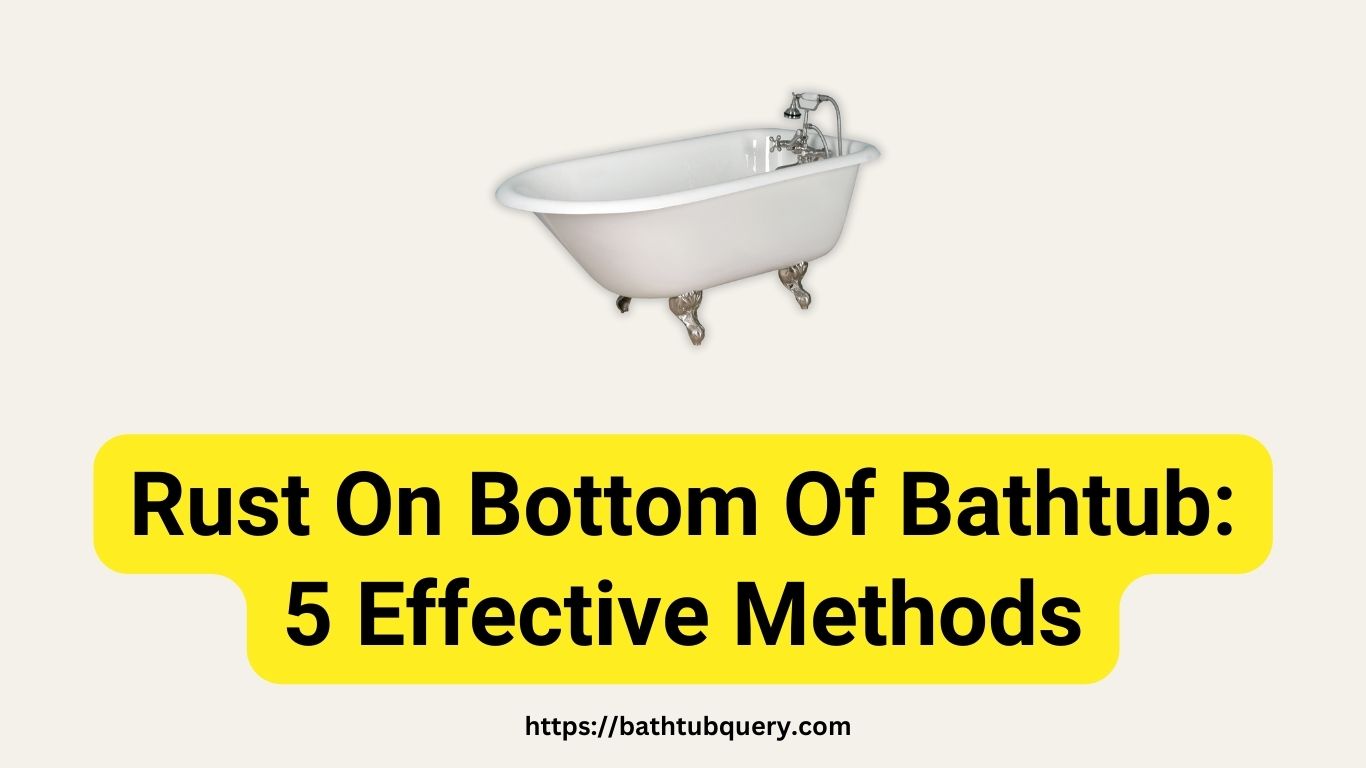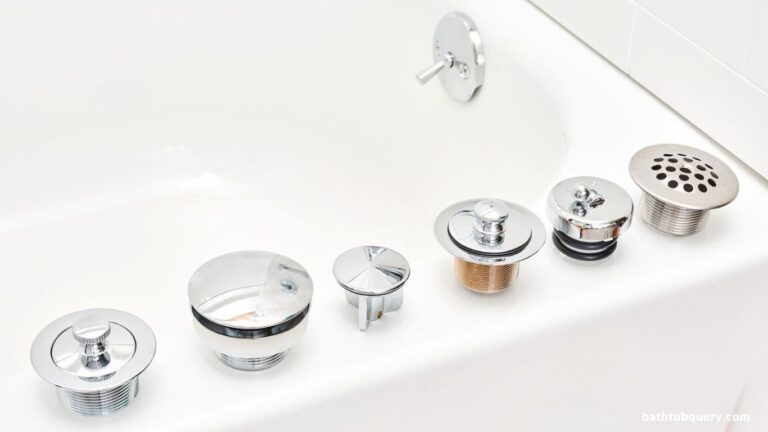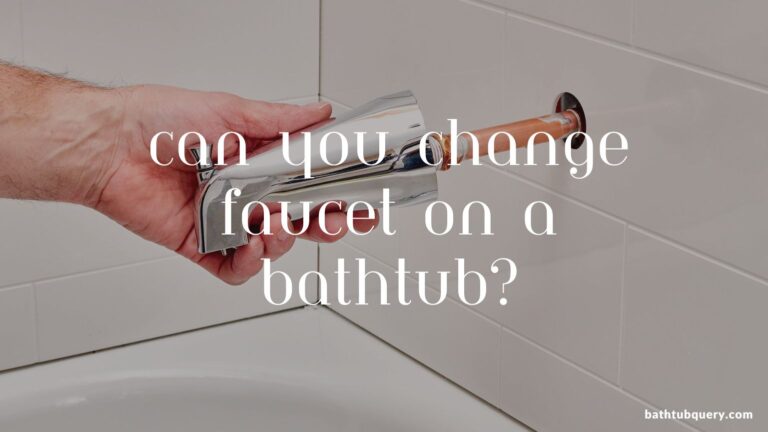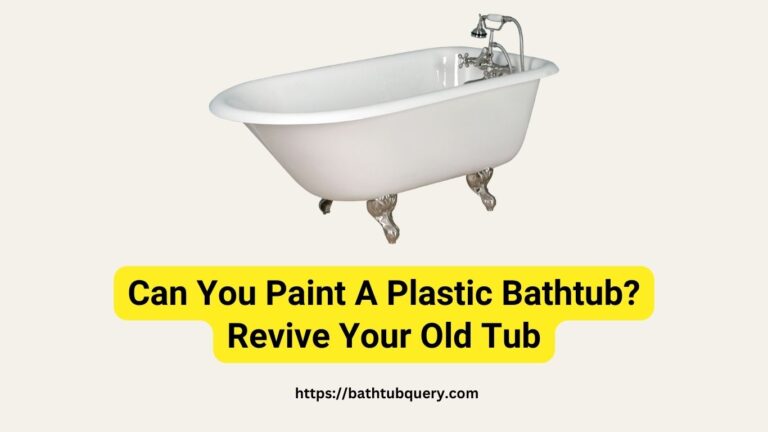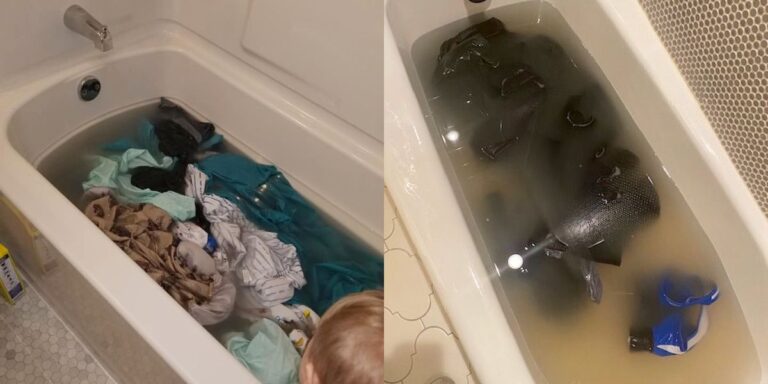Facing Rust On Bottom Of Bathtub? 5 Effective Methods
Rust stains on the bottom of your bathtub can be unsightly, irritating, and difficult to remove. This common household problem arises from the interaction between water, iron, and oxygen, which create a red, brown, or yellowish residue that can tarnish the aesthetic of your bathroom.
Though it may seem impossible, a sparkling clean bathtub can be yours again. In this article, we will dive into 5 effective methods for removing rust from the bottom of a bathtub, providing you with actionable steps and a comprehensive guide to reclaim the shine of your tub. Read this post about How to Remove Rust from Your Enamel Tub?
What is Rust on the Bottom of the Bathtub?
Bathtub rust often originates from metal components, such as the drain or faucets, exposed to moisture and oxygen. Over time, these conditions cause a chemical reaction that results in rust. Even non-metal tubs aren’t safe from rust stains, especially if your home water supply contains high iron content. Want to know more about the causes of rust stains in Your Bathtub?
The Impact of Bathtub Rust
Besides being an eyesore, rust in bathtubs can also harbor bacteria that pose health risks. Moreover, rust can degrade your bathtub material over time, leading to potentially expensive repairs or replacements.
5 Effective Methods For Removing Rust On The Bottom Of A Bathtub
Whether you’re dealing with stubborn stains or small patches, the following methods can help restore your tub’s sparkle: And don’t forget to check out the List Of The Best Bathtub Rust Removers
1. Natural Acidic Cleaners: Lemon and Salt
Lemon and salt, staples in many kitchens, can be powerful weapons against bathtub rust. The citric acid in lemons combined with the abrasive nature of salt can break down and lift rust stains.
- Cut a lemon in half and sprinkle a generous amount of salt on the rust stain.
- Rub the lemon half onto the rust stain, ensuring the salt and lemon juice are adequately covering the area.
- Let the mixture sit for 2-3 hours to allow the acidic solution to break down the rust.
- Rinse the area thoroughly and scrub lightly if necessary.
2. Commercial Rust Removers
Commercial rust removers, like CLR or Bar Keepers Friend, are specifically designed to deal with stubborn rust stains.
Steps to use commercial rust removers:
- Follow the instructions provided on the product label. Most will instruct you to apply the product directly to the stain.
- Allow the cleaner to sit on the rust stain for a designated period (usually around 15-30 minutes).
- Scrub the stain using a non-abrasive scrubbing pad or brush.
- Rinse the bathtub thoroughly to remove the cleaner.
Though potent, commercial rust removers should be used with caution. Always wear protective gloves and ensure proper ventilation to avoid inhalation of harmful fumes.
3. Baking Soda and Vinegar
Baking soda and vinegar, when combined, form a fizzy reaction that can dislodge rust stains from the surface of your bathtub. Here’s how to do it:
- Mix equal parts of baking soda and vinegar to form a paste.
- Apply this paste to the rust stain and let it sit for 15-20 minutes.
- Scrub the area with a soft brush or sponge.
- Rinse thoroughly with water.
Remember to repeat the process if necessary. Patience is key when dealing with stubborn rust stains.
4. Pumice Stones
Pumice stones, though a slightly more abrasive method, can be effective in removing rust stains from porcelain or enamel bathtubs.
How to use a pumice stone for rust removal:
- Soak the pumice stone in warm water for 15 minutes to soften it.
- Gently rub the stone on the rust stain using circular motions. Be careful not to apply too much pressure to avoid scratching the surface.
- Rinse the area frequently to check your progress and to wash away loose rust particles.
- Once the rust is removed, clean the area with a mild detergent and rinse thoroughly.
5. Hydrogen Peroxide and Cream of Tartar
The combination of hydrogen peroxide and cream of tartar can effectively deal with severe rust stains.
Steps to follow:
- Mix cream of tartar and hydrogen peroxide to form a thick paste.
- Apply this paste to the rust stain.
- Let it sit for 30 minutes to an hour.
- Scrub with a soft brush or sponge until the rust stain is gone.
- Rinely thoroughly with water.
How to Prevent Future Rusting?
Prevention is better than cure, and the same holds true for bathtub rust. Here are a few tips to keep rust at bay:
- Regular Cleaning: Clean your bathtub regularly to avoid the buildup of rust-causing substances.
- Keep it Dry: After using the tub, ensure that you dry off any metal parts to minimize the chances of rusting.
- Use Rust-Resistant Fixtures: Consider using rust-resistant fixtures, such as stainless steel or brass, to prevent rust formation.
- Water Treatment: If your water supply has a high iron content, consider investing in a water treatment system to reduce iron levels.
Key Takeaways
Rust on the bottom of your bathtub can be a nuisance, but with a bit of elbow grease and the right approach, it’s definitely beatable. DIY natural rust removers, such as baking soda, vinegar, and lemon, can be effective for minor rust stains. For more stubborn spots, commercial rust removers might be the way to go. Prevent future rusting by maintaining regular cleaning, keeping your tub dry, using rust-resistant fixtures, and considering a water treatment system if necessary.
FAQs
What causes rust on the bottom of the bathtub?
Rust often originates from metal components, such as the drain or faucets, that are exposed to moisture and oxygen.
Can rust in bathtubs pose health risks?
Yes, rust can harbor bacteria, which could pose health risks.
Can DIY natural rust removers effectively eliminate rust?
Yes, DIY natural rust removers like baking soda, vinegar, and lemon, can help remove minor rust stains.
Are commercial rust removers safe to use?
Commercial rust removers can be effective but should be used with caution. Always wear gloves and protective eyewear.
How can I prevent rust from forming on my bathtub?
Regular cleaning, drying off metal parts after use, using rust-resistant fixtures, and considering a water treatment system can help prevent rusting.
Related article:
- Why Bathtub Feels Like Sandpaper? Here Is The Solution
- Is A Peeling Bathtub Dangerous? What Homeowners Should Know
- Can You Paint a Fiberglass Bathtub? Breathe New Life into Your Bathroom

Amanda has been designing and installing bathtubs for over 15 years. She first got interested in the bathtub industry while working as an interior designer right after college. During her years as a designer, Amanda was frustrated by the lack of high-quality, unique bathtub options for her clients. This passion led her to start her own bathtub website in 2009.

